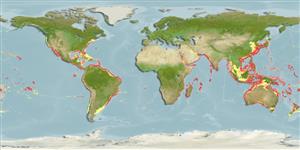Common names from other countries
Environment: milieu / climate zone / depth range / distribution range
экология
морской ассоциированный с рифами; пределы глубины 40 - 400 m (Ref. 9335), usually 165 - 200 m (Ref. 9335). Subtropical; 46°N - 56°S, 25°E - 5°W
Circumglobal in tropical and tropically influenced seas. Indo-Pacific: South Africa to the central Pacific islands, north to Japan and Korea, south to southeastern Australia. Eastern Pacific: Baja California to Peru. Western Atlantic: Nova Scotia, Canada (Ref. 47377) and New Jersey, USA to probably Argentina (Ref. 11441). Abundant at St. Helena but no substantiated records in eastern Atlantic from the African coastal region or the Canary Islands. Often misidentified as Cookeolus boops, a junior synonym of Heteropriacanthus cruentatus (Ref. 11441).
Size / Вес / Возраст
Maturity: Lm ? range ? - ? cm
Max length : 69.0 cm NG самец/пол неопределен; (Ref. 89467); common length : 30.0 cm TL самец/пол неопределен; (Ref. 5217); наибольший вес (опубликованные данные): 5.0 kg (Ref. 89467); наибольший возраст (опубликованны данные): 9 годы (Ref. 5403)
колючие лучи спинного плавника (общее число) : 10; членистые (мягкие) лучи спинного плавника (общее число) : 12 - 14; колючие лучи анального плавника: 3; членистые (мягкие) лучи анального плавника: 12 - 14. Last (10th) dorsal spine twice the length of the second (Ref. 48635).
Found on hard bottoms to a depth of about 400 m and reported to be moderately common at depths of 165 to 260 m in association with rocky holes and ledges; preferably with rich invertebrate growth such as sponges and soft corals (Ref. 48635). Benthopelagic (Ref. 58302). Juveniles pelagic (Ref. 9335, 9563). Feed on pelagic crustaceans (Ref. 9335). Probably spawns in the Caribbean from May to September. Solitary (Ref 90102).
Life cycle and mating behavior
Maturities | размножение | Spawnings | Egg(s) | Fecundities | личинки
Starnes, W.C., 1988. Revision, phylogeny and biogeographic comments on the circumtropical marine percoid fish family Priacanthidae. Bull. Mar. Sci. 43(2):117-203. (Ref. 5403)
Статус Красного Списка МСОП (Ref. 130435)
CITES (Ref. 128078)
Not Evaluated
Угроза для людей
Harmless
Использование человеком
рыболовство: коммерческий; аквариум: коммерческий
дополнительная информация
инструменты
Специальные отчеты
Скачать в формате XML
ресурсы в Интернет
Estimates based on models
Preferred temperature (Ref.
115969): 12.2 - 21.8, mean 15.6 (based on 136 cells).
Phylogenetic diversity index (Ref.
82804): PD
50 = 1.0000 [Uniqueness, from 0.5 = low to 2.0 = high].
Bayesian length-weight: a=0.02089 (0.01096 - 0.03984), b=2.89 (2.72 - 3.06), in cm Total Length, based on LWR estimates for this species & (Sub)family-body (Ref.
93245).
Trophic level (Ref.
69278): 3.5 ±0.60 se; based on food items.
устойчивость к внешним воздействиям (Ref.
120179): средний (среднего размера), минимальное время удвоения популяции 1.4-4.4 года (tmax=9).
Fishing Vulnerability (Ref.
59153): Low to moderate vulnerability (27 of 100).
